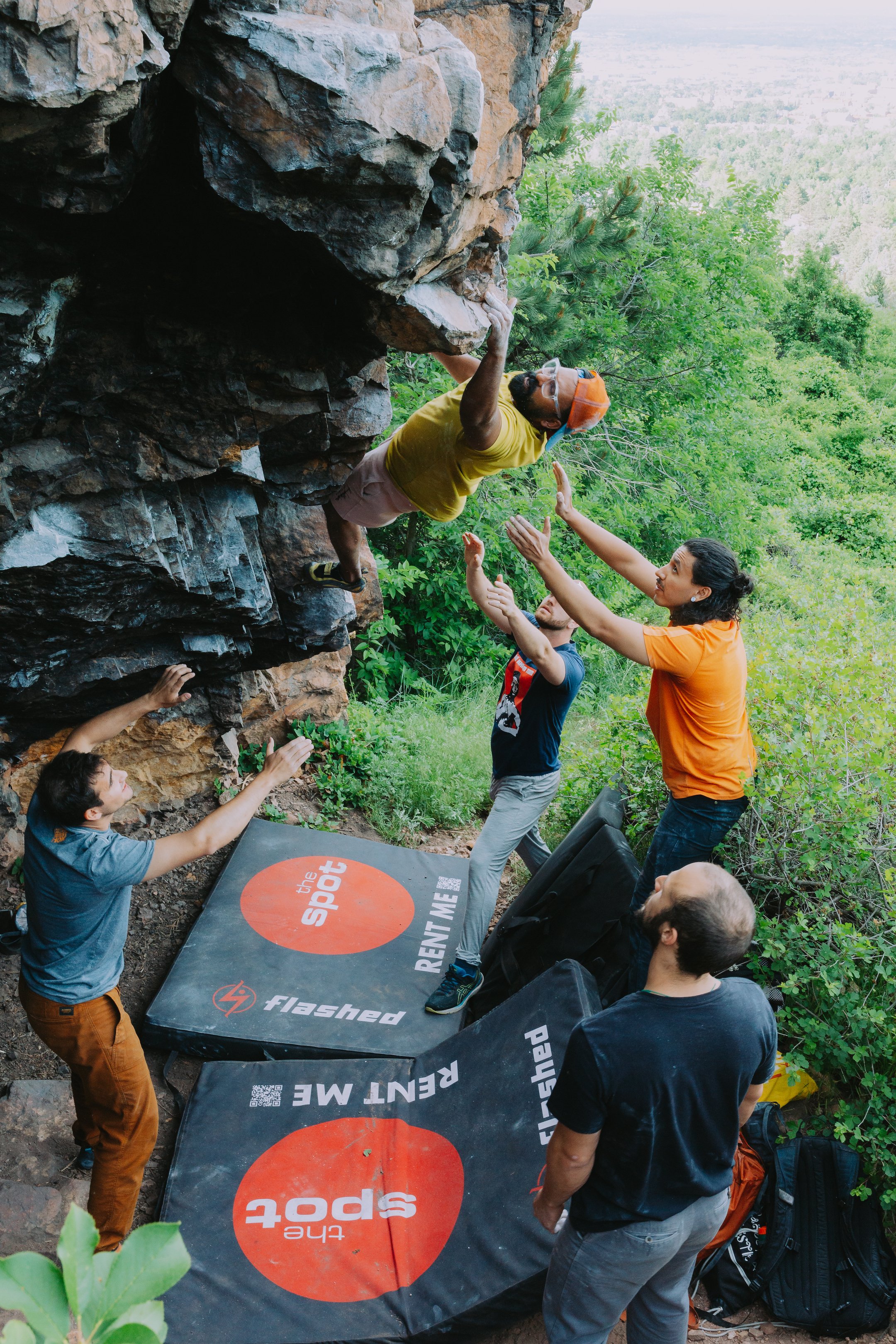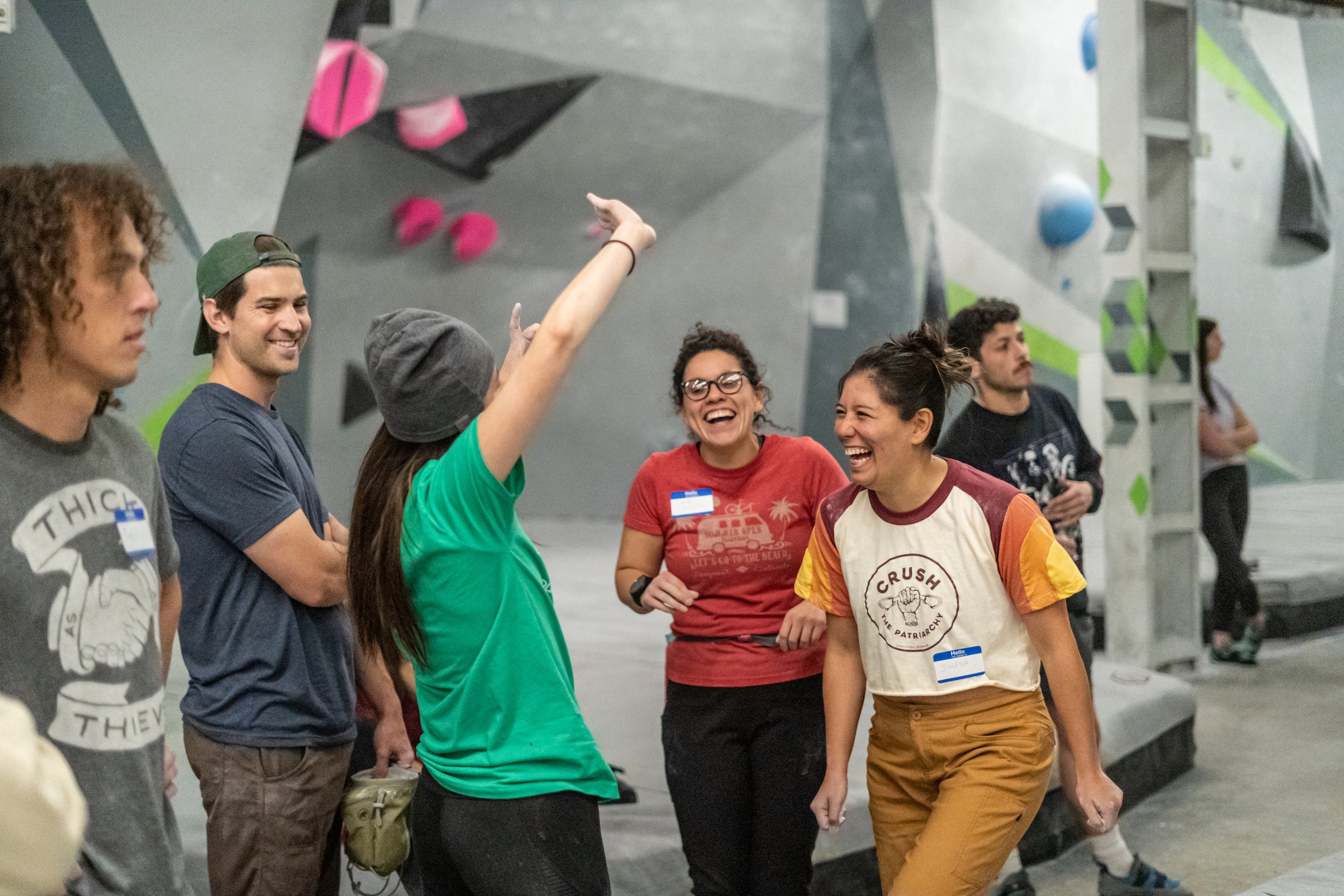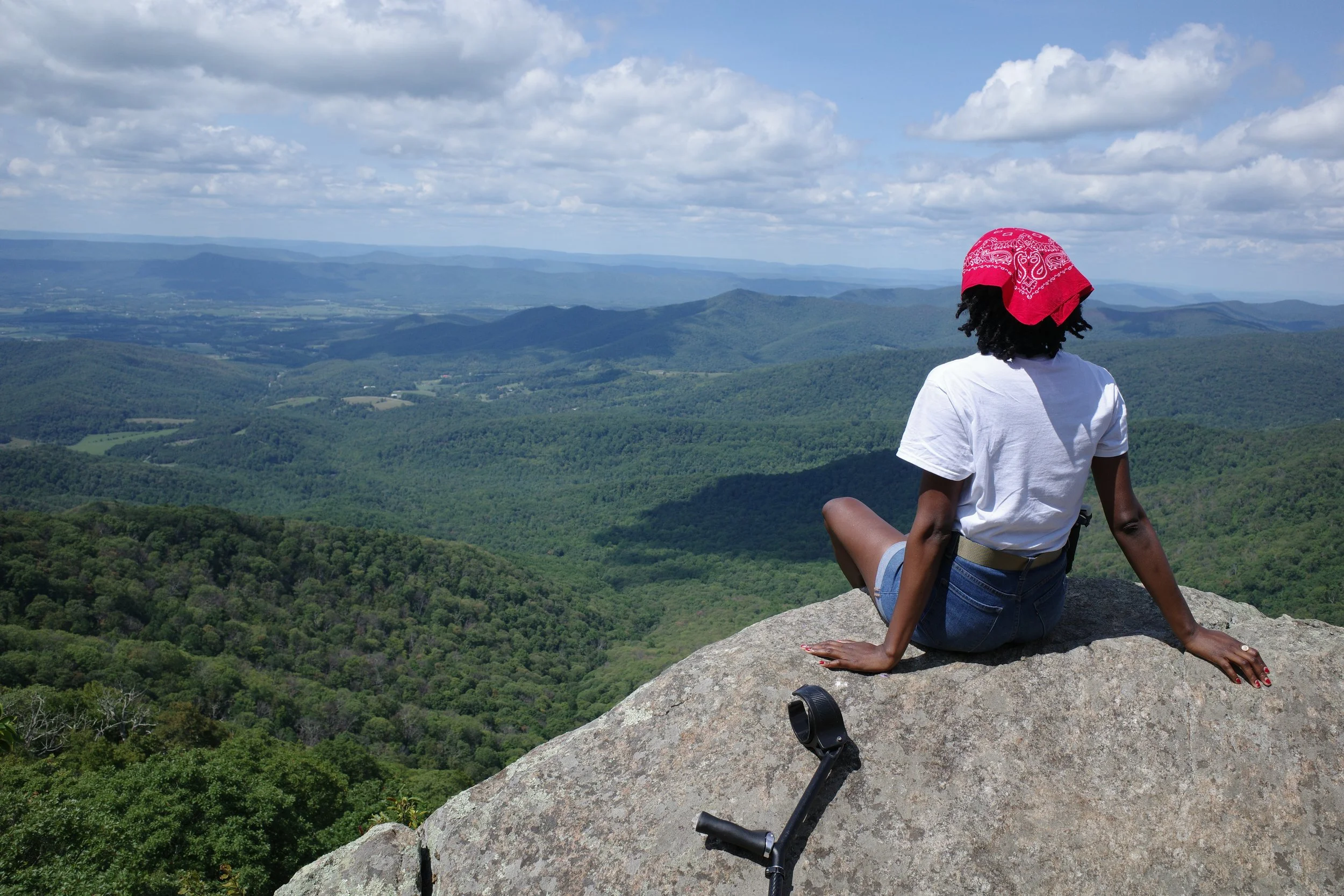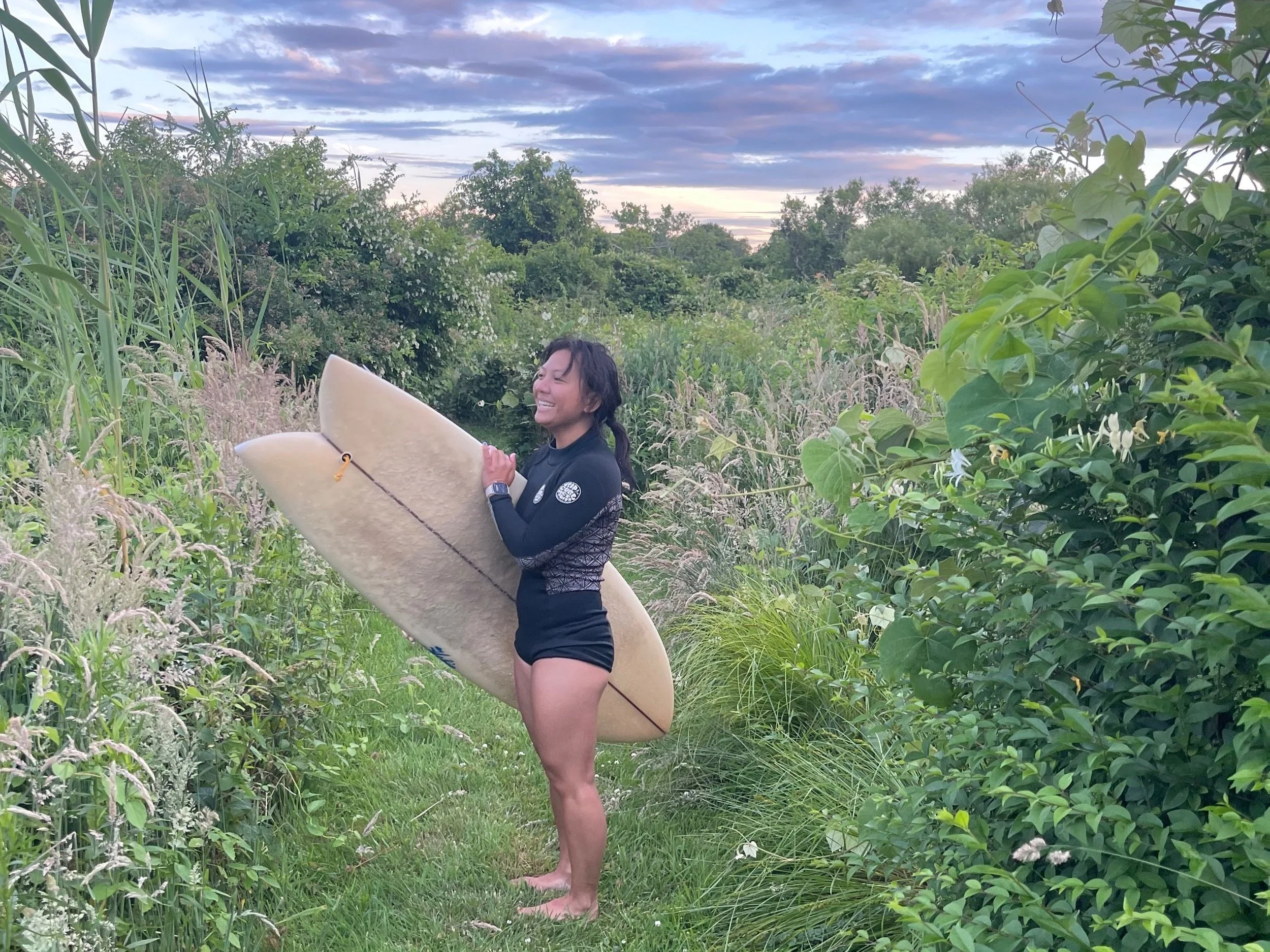The Magic of Building Outdoor Community
Photo by @santacruzbliss
Have you ever walked into a room full of strangers, only to find yourself feeling at home right away? Even if you don’t know the faces around you, you look forward to making friends instead of feeling anxious about how others will perceive you. This is what it feels like to be an underrepresented identity in an affinity space.
An affinity space is an intentionally curated space where people of shared identities come together to celebrate each other and build community. Really, it’s a space where you can unmask and show up fully.
For me, taking up space in sports that are dominated by Anglo, able-bodied males means having to code switch. Whether I’m traversing technical terrain or trying a whole new sport, I am constantly thinking about the social norms of a culture I don’t even belong to. I am juggling technical aspects of the sport—like how to hold an ice axe or build an anchor—all while worrying if the white men around me will be offended if I speak in Spanish or if express myself ‘too loudly’. I worry about unwanted approaches. I know expressing myself freely in these places would just lead to further gatekeeping and racial violence. It has happened many times.
Affinity spaces can be pure magic. Some of my favorite and most powerful affinity space experiences have been directly linked to spending time outdoors, whether it be camping, backpacking or trying a whole new sport. Being in a space where your baseline safety requirements are met opens up your capacity for learning. Being in a community where you are not ‘the only one’ means the ability to physically relax and shift your energy towards having new experiences, building lifelong friendships and learning new skills.
If I had known about affinity spaces when I first began participating in outdoor sports I would have saved myself a lot of difficult encounters. Through my outdoor career I have met several community leaders doing amazing work to provide affinity spaces and safety to BIPOC youth, adult learners, and lifetime athletes. Learn more about them below:
Xavier Bravo is a Latinx leader in the climbing community. He received a BS in Psychological & Brain Sciences from Washington University in St. Louis and it was there that he also developed his love for la naturaleza through his university’s Outing Club and Climbing Team. His work as an Outdoor and Environmental Educator has taken him to the snowy peaks of Alaska, the lush rainforests of Madagascar, and his current home in colorful Colorado as the new Event Coordinator for the American Alpine Club. I sat down with him to learn more about his org, Escaladores Unidos.
What is Escaladores Unidos?
According to a recent study by the American Alpine Club, Latine climbers only account for 8% of the total U.S. climbing population despite being nearly 20% percent of the U.S. total population. More than 1 million Latine/x individuals do not identify as climbers, either because they have never been exposed to the sport or because they do not have regular access to climbing. Escaladores Unidos (EU) is an affinity group created to provide folks from the Hispanic & Latine/x community opportunities to connect through a shared passion for cultura, comunidad y climbing, including consistent gym meet-ups and outdoor skills clinics.
Photo by @murillofotografia
EU was established in November 2022 in Boulder, Colorado and has since grown to serve the Latine community throughout the greater Denver area, Fort Collins, Colorado Springs, and Salt Lake City, Utah. Although major cities are quickly becoming the fastest source of growth for the climbing population, marginalized communities, like Latines residing in these urban areas, are often left out of this trend due to resource constraints. EU gym meetups provide discounted day-passes for the community while skills clinics foster connection and build technical knowledge for both beginner & advanced escaladores.
Exposure to the sport, familiarity of other climbers, and improvement of climbing skills increases opportunities for our comunidad to then venture afuera as transitioning to the outdoors is a pivotal step in EU's vision. Marginalized identities are often the most negatively affected by lack of green spaces & policies. Repetitive exposure to the outdoors will lead to familiarity of recreational areas and increase knowledge throughout the community. Once folks feel confident enough to plan outings of their own and foster a sense of independence, a sense of sustainability - both in terms of stewardship and of accessibility to the sport for that individual - will also be achieved. Connection with the outdoors promotes environmental stewardship, empowering Latine/x community members to combat policies negatively affecting their population. By implementing these touch points, EU creates opportunities for Latine/x individuals to connect, feel comfortable and safe, and climb in spaces they have traditionally been excluded from.
Why is it important for the world of climbing to create space for Latinx climbers?
In addition to the Latine population being the second largest ethnicity in the US, we also hold some of the greatest socio-economical, political, and environmental influences that affect the world of climbing. The emergence and rapid growth of organizations such as Escaladores Unidos, Escala, Escalemos-Raza, and Latino Outdoors to name a few are all signs of the clear need and reciprocal want of these spaces within our comunidad.
After 3 years of guiding professionally, my career introduced me to all sorts of escaladores: those that were beginning their climbing journeys & those that were sponsored professionals. Those whose families immigrated here, and those were the “nth” generation. Those whose first language was Spanish and those who were actively learning their mother tongue. What I had seen in my career up to that point did not match what I was observing in climbing media - our community was missing from that narrative. I have been fortunate enough to be given many opportunities to progress through my climbing career and gain the confidence, skills, and connections necessary to implement an organization such as EU. In 2021, I was accepted into the AMGAs affinity SPI course, funded by Black Diamond. This subsequently introduced me to many folks who were using their newfound skills to give back to their communities - Flash Foxy ambassadors, Brown Girls Climb facilitators, and the founder of Texas Lady Crushers. They inspired me to think long and hard about how to make the most of my new certification and what it means to be part of a community greater than yourself.
“It would have been a waste if I had not used all of these newfound skills to increase accessibility, visibility, and representation to the sport of climbing for mi gente. ”
Why do affinity spaces matter?
Photo by @marcsometimes
Affinity spaces offer so much more than just an opportunity to connect with folks who look like you; they offer us a necessary space for safety, healing, mentorship, exploration, celebration, and collaboration between our intersectional and multifaceted identities outside of the dominant cis-white heteronormative culture we have been raised to believe is the standard. In a world were we are constantly being told - whether explicitly or implicitly - that we do not fit the mold, it reaffirms us that we belong, we are loved, and we are deserving of these incredibly life-changing activities just as much as anyone else. It reminds us that we are not singular in our experiences and that we have others we can rely on, talk to, and learn from who have been shaped through similar life circumstances. Affinity spaces offer an opportunity to center and focus on the needs and wants of a minority community that might otherwise be lost in a discussion with the dominant culture. They allow complex problems to have creative solved through the lens of minority culture who’s expertise is not observed because it is not to the benefit of the patriarchy. Affinity spaces matter simply because we are still being constantly told that they don’t. We are still being told to quiet down, to stay in the background, and that our experiences are invalid. It is exhausting to have to constantly fight back, educate, and code-switch to a society that pretends to be an ally, when it was crafted perfectly to keep us and our voices oppressed. These affinity spaces are the opposite of all of that - and it will not be until they are accepted and welcomed without question that they will always matter.
What is your goal for the future of EU? What is your dream for the future of the climbing community at large?
Although Escaladores Unidos is a simple meet-up group now, my hope is it can one day grow into a larger movement. One which’s main objective is understood to be necessary even without EU’s facilitation. It should be the goal of every service organization to work itself out of existence - to reach a point where the problem that they are trying to solve is no longer a societal issue. EU will continue to do its work until accessibility to the sport for its community is felt by all Latine folxs. We don’t have to have chapter in every state, and we don’t need to have $100 million dollars in our bank account for that dream to become a reality. In truth, what we need is unrelenting allyship. We need those who hold power, connections, wealth, influence, and expertise in the outdoor industry to step up and use those privileges to build up the communities that they willingly left behind. This sentiment not only applies to the Hispanic community, but extends to the larger BIPOC, LGBTQIA2S+, Adaptive, Plus-Size, Women’s, etc. communities that have also been marginalized and traditionally excluded from the climbing community. We each have complex & intersectional identities that flow in and out of these affinity spaces depending who or what we feel comfortable expressing as our whole-selves. I hope EU can do more cross-collaboration between groups doing amazing work in these spaces, and we can learn from, grow with, and uplift one another to do the work that is necessary to combat barriers to entry and progress we see and experience daily. I hope these groups gain the visibility and following they deserve so we can easily refer others when we see someone in need of community. Ultimately, I hope to one day see that the larger climbing community understands the necessity of these spaces while collectively working towards dismantling barriers without our plea to do so. I truly do not know if that will be accomplished in my lifetime, but I won’t let that stop me from trying.
You can read more about EU’s work by visiting their website, Facebook, Instagram, or watch Black Diamond’s featured film here. With a volunteer team of less than 15 individuals, EU primarily relies on donations to continue its program. Support their work by donating here.
Josue De Luna Navarro is an AMGA Certified Single Pitch Instructor and an Apprentice Alpine Guide and Mexican immigrant. Josue grew up undocumented in the US, and the lived experience of his family and community motivated him to get involved in community organizing for immigrant, racial and climate justice. Josue combined his passions for outdoor access and immigrant justice by founding the Semilla Project.
What is the Semilla Project?
The Semilla Project is a center for transformation based in New Mexico that is preparing a strong generation of BIPOC leaders through land based learning, the outdoors, leadership development and civic engagement. In other words, we galvanize and mobilize youth of color to act on climate justice while building them as leaders and environmental stewards through outdoor recreation. We were founded during the midst of the pandemic. Through different community based grassroots organizing spaces we identified the need to create safe spaces for our youth to first connect with the land and each other in the outdoors before politizing them. We aim to create a safe space for our youth to fall in love with the outdoors, connect with the land and one another, and grow as leaders for their community.
Why is it important for the world of climbing/larger outdoor industry to create space for Latinx folks? Why now? (If you have any personal stories or experiences you can tie to, both positive or negative, this is a good place to include them)
Our communities not only deserve experiences and spaces designed by and for them - they also deserve seeing a reflection of themselves with the folks leading outdoor spaces. Through my experience I’ve seen the huge value and impact that representation creates in a young person's life; when they see that the instructors and guides look like them, speak like them, and understand where they come from.
It is important to create these spaces not just for our communities to feel safe, but also to inspire them that they can pursue their dreams and even a career in the outdoors yet aso not internalize whiteness and be our full selves in this industry.
Affinity spaces matter because we get to reclaim the narrative of why and how we engage with the outdoors. I believe that due to media/marketing from the outdoor industry, we’ve internalized whiteness in our perception of how to be “outdoorsy”. This ultimately does more damage to our collective freedom as people of color than it does good.
“We deserve spaces where we get to design curriculums, engagement and programming that our people are actively engaging in to fully support who we are as a community rather than changing our community to fit a white framework of what is outdoors. ”
Our goal with Semilla Project is to expand our community based framework to other states like AZ, TX and to South Dakota where we have built strong partnerships with other orgs looking to implement similar organizing models. We believe this model works not just to get our youth outdoors but also to build a strong movement of youth of color engaging in climate justice. We also have a goal for our members and leaders in our community to have the opportunity to gain training to become outdoor educators and mountain guides through our leadership pipelines. Our dream is for our youth to see the power they have when they get together and reclaim their humanity through outdoor recreation and sit in policy decision-making tables for our communities’ wellbeing.
You can read more about The Semilla Project’s work by visiting their Instagram. Support their work by donating here.

























I also know that hunger disproportionately impacts Black Americans who make up nearly 30% of SNAP recipients. So why would I celebrate cuts to a program that is a lifeline for so many people?